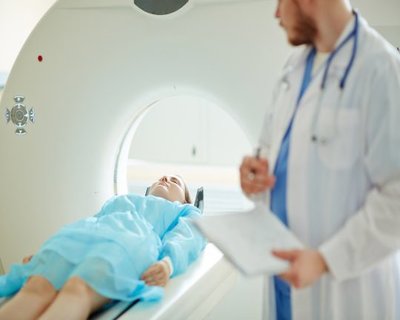- Home
- Editorial
- News
- Practice Guidelines
- Anesthesiology Guidelines
- Cancer Guidelines
- Cardiac Sciences Guidelines
- Critical Care Guidelines
- Dentistry Guidelines
- Dermatology Guidelines
- Diabetes and Endo Guidelines
- Diagnostics Guidelines
- ENT Guidelines
- Featured Practice Guidelines
- Gastroenterology Guidelines
- Geriatrics Guidelines
- Medicine Guidelines
- Nephrology Guidelines
- Neurosciences Guidelines
- Obs and Gynae Guidelines
- Ophthalmology Guidelines
- Orthopaedics Guidelines
- Paediatrics Guidelines
- Psychiatry Guidelines
- Pulmonology Guidelines
- Radiology Guidelines
- Surgery Guidelines
- Urology Guidelines
CT scans may increase the risk of brain cancer in children

CT scans, commonly used in medical imaging, may increase the risk of brain tumors, according to a new study recently published in the Journal of the National Cancer Institute.
There has been a significant increase in the use of computed tomography (CT) scans in the last few years. Tough CT scans appreciably diagnose the abnormalities in the body and assist the healthcare providers in further treatment but during the scan process, large doses of radiation are encountered by the patients. Especially the children need to be protected from such radiations causing more harm in them as they are more susceptible to radiation-related malignancies than adults and have more time to show effects from the potential risk.
The most common malignancies caused by radioactivity among children and young adults are leukemia and brain tumors. Researchers, therefore, evaluated leukemia and brain tumor risks following exposure to radiation from CT scan in children.
Johanna M Meulepas and his colleagues conducted a retrospective cohort study to evaluate leukemia and brain tumor risk following exposure to low-dose ionizing radiation from CT scans in childhood.
For a nationwide group of 168,394 Dutch children who received one or more CT scans between 1979 and 2012, researchers obtained cancer incidence and vital status by record linkage. They surveyed all Dutch hospital-based radiology departments to ascertain eligibility and participation. In the Netherlands, pediatric CT scans are only performed in hospitals.
The study included 168 394 children who received one or more CT scans and were younger than age 18 years. The authors obtained cancer incidence, vital status, and confounder information by record linkage with external registries.
Read ALso: Are patients sufficiently shielded against stray radiation during CT scans?
The researchers found that the overall cancer incidence was 1.5 times higher than expected. For all brain tumors combined, and for malignant and nonmalignant brain tumors taken separately, dose-response relationships were observed with radiation dose to the brain. No association was found for leukemia as the radiation doses to the bone marrow, where leukemia originates, were low.
"Epidemiological studies of cancer risks from low doses of medical radiation are challenging, said the study's principal investigator, Michael Hauptmann. "Nevertheless, our careful evaluation of the data and evidence from other studies indicate that CT-related radiation exposure increases brain tumor risk. Careful justification of pediatric CT scans and dose optimization, as done in many hospitals, are essential to minimize risks."
The study concluded that radiation exposure through CT scan is linked to increased risk of the brain tumor but was not associated with leukemia. Moreover, the incidence of brain tumors was higher in the cohort of children with CT scans as compared to the general population.
For reference log on tohttp://dx.doi.org/10.1093/jnci/djy104

Disclaimer: This site is primarily intended for healthcare professionals. Any content/information on this website does not replace the advice of medical and/or health professionals and should not be construed as medical/diagnostic advice/endorsement or prescription. Use of this site is subject to our terms of use, privacy policy, advertisement policy. © 2020 Minerva Medical Treatment Pvt Ltd